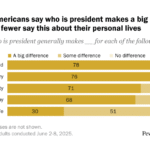Atlanta-area after-school and summer program providers are sounding the alarm after the Trump administration abruptly paused their federal grants.
The U.S. Department of Education notified states last week that it would withhold and review more than $6 billion in funding that had been approved for FY 2025.
In a statement to WABE, a spokesperson from the White House’s Office of Management and Budget said the review is ongoing and that “no decisions have been made yet.” It was not specified when the review will be finished.
“Initial findings show that many of these grant programs have been grossly misused to subsidize a radical leftwing agenda,” the spokesperson wrote, choosing not to identify which programs had been misused.
One of the grants impacted by this freeze is the 21st Century Community Learning Centers (21st CCLC) grant, which helps fund after-school services. In FY 2024, Georgia received $47 million through the grant.
For many metro Atlanta after-school providers, the federal grant is urgently needed to cover the cost of ongoing or future services, such as food, education and sports activities.
Kim Nelson, the chief program officer of the YMCA of Metro Atlanta, said the organization needs that money to reimburse expenses for its May after-school program and the June summer day camp. Starting in August, after-school programs in 23 Georgia YMCAs could also be in jeopardy.
“Unfortunately, the community that we serve, they are in an at-risk and low-income community, and this funding is so important to be able to provide the different services, and the program would look completely different,” she said. “You’re basically saying that [the] majority of us would need to close our doors and not offer programming.”
The freeze also impacts around $1.7 million in funding for the Boys and Girls Clubs of Metro Atlanta, which would affect 500 students across six after-school programs.
On top of the current FY 2025 funding freeze, the YMCA and the Boys and Girls Clubs were already planning to strategize around a proposed change to the 21st CCLC grant for FY 2026.
President Donald Trump’s budget request for next year includes consolidating the $1.3 billion spent on the 21st CCLC alone into a catch-all K-12 Simplified Funding Program. This $2 billion grant would take the place of more than $5.7 billion in designated funding for literacy, rural education, student support and homeless student grants and instead give states the power to decide how to spend the money.
“Secondary to the immediate concern of the impoundment of funds, we are worried as well about the program being zeroed out in the future,” said Ryan Greenstein, advocacy program manager at the YMCA of Metro Atlanta.
“So this is, we know, bigger than just this one program, and we’re concerned about, again, the impact not just on us, but [it] is a nationwide problem for the YMCA movement.”
Similarly, although the Boys and Girls Clubs of Metro Atlanta had already been exploring alternatives to prepare for the president’s budget request for next year, the organization does not have a contingency plan in place for the immediate funding freeze.
“If we are not able to do that, we will have to make some decisions as to whether or not we can keep clubs open, move the children to other safe clubs and spaces, or close those clubs. And that is not something we desire to do at all,” said Libby Wright, the CEO of the Boys and Girls Clubs of Metro Atlanta.
Nelson said the freeze impacts families who are relying on after-school programs to be able to work come next fall.
“They’re part of the after-school program because they don’t have working hours where they can come pick up their kids after school has ended, which is around 2:30,” Nelson said.
“It’s hurting the families financially, and it’s also going to be impacting kids that need the extra help to be able to thrive in school.”
According to Wright, Boys and Girls Clubs’ after-school programs also provide educational opportunities that supplement what students are learning in their classrooms.
“We’re also helping them to avoid other risky behaviors that may happen in those critical after-school hours,” Wright added.
Katie Landes, director of the Georgia Statewide Afterschool Network, an organization that provides resources to and advocates on behalf of after-school programs across Georgia, called the uncertainty surrounding the funding freeze “unprecedented.”
“We still have a lot of questions — what is the immediate impact and how quick this impact will [be]? — but there’s absolutely the potential for the professionals who are working in these programs to also lose their jobs,” Landes said.
According to the director, GSAN is urging after-school programs in its network to call on their representatives and the White House Office of Management and Budget to release the funds.










